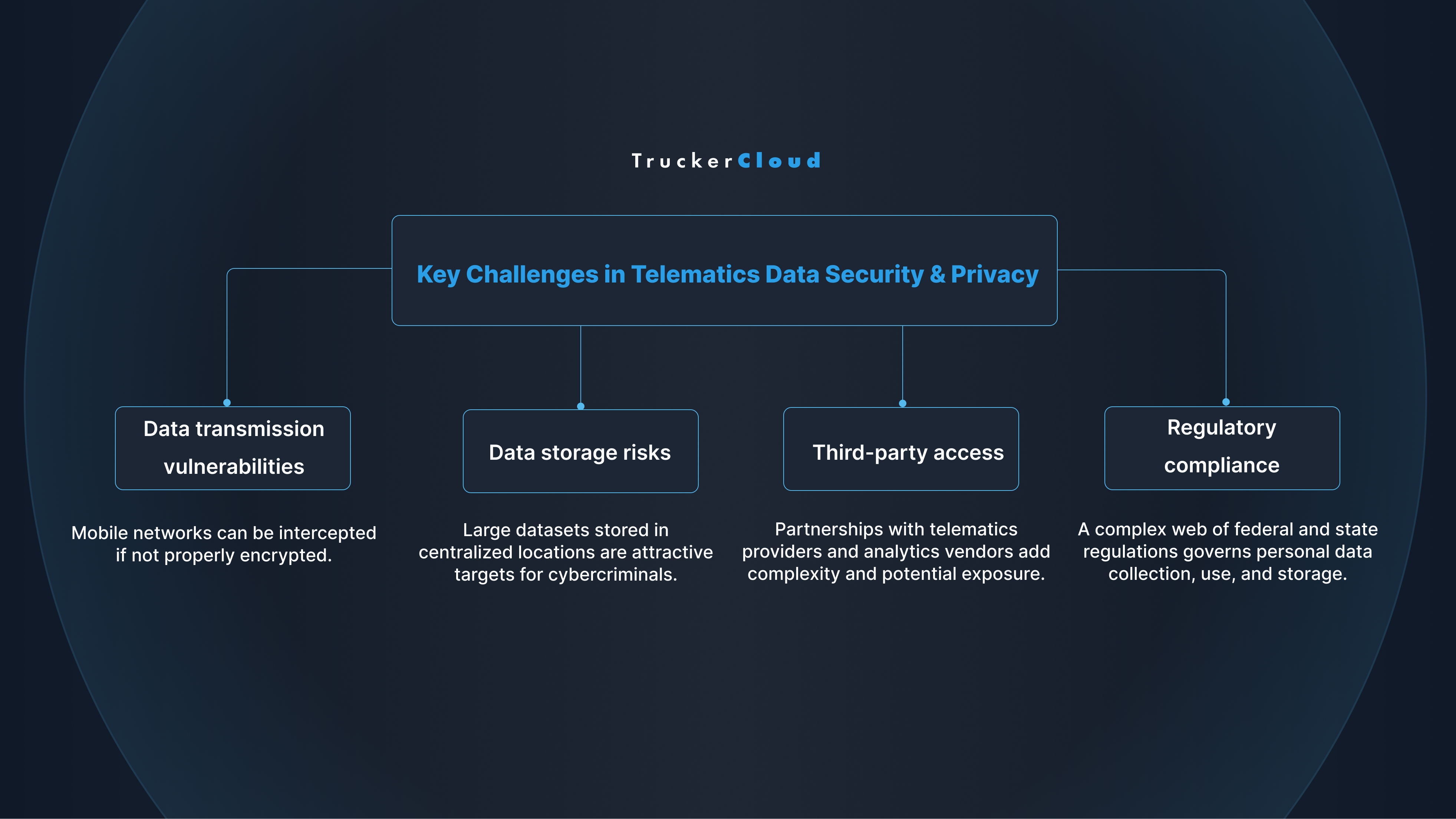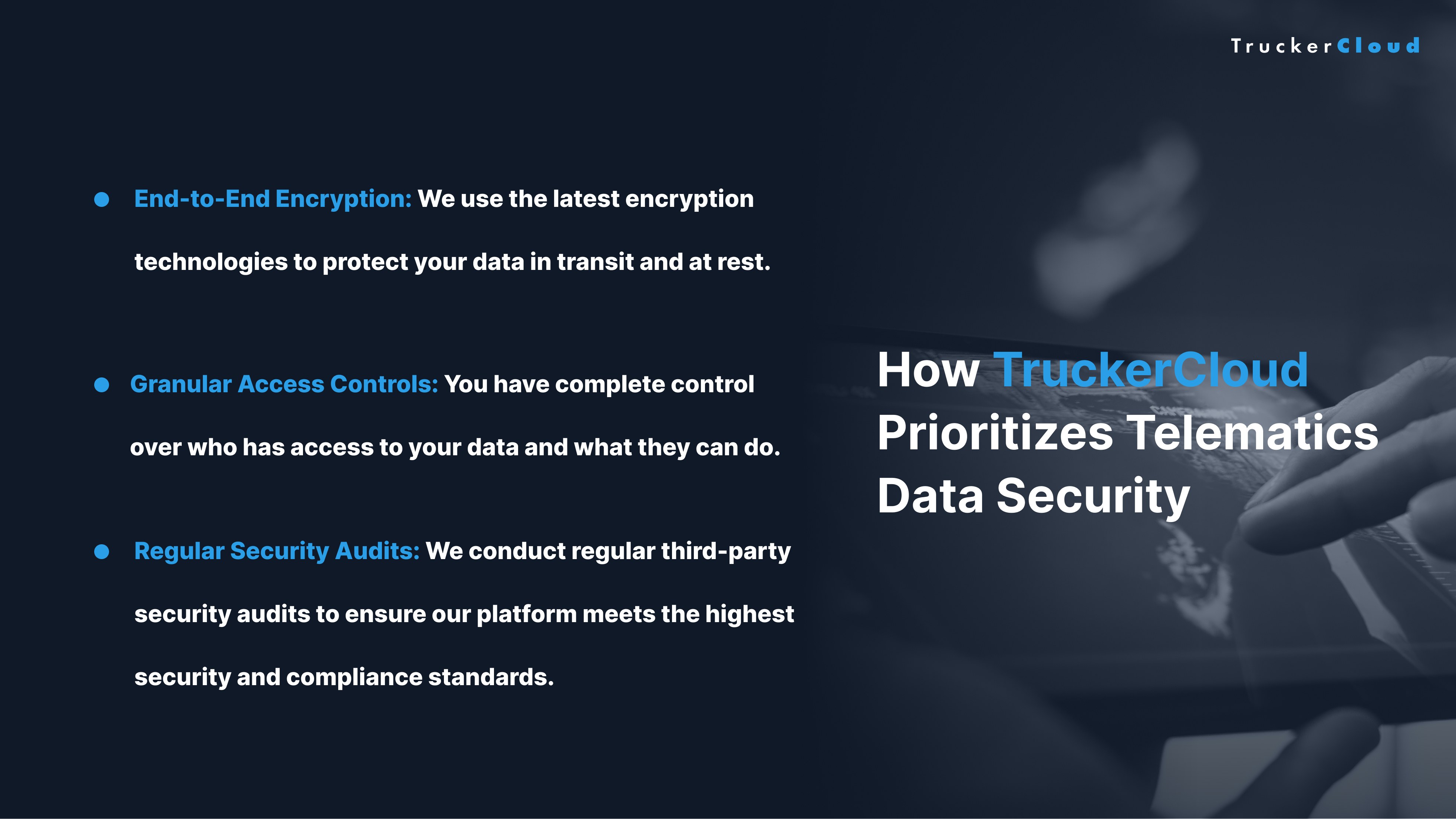Telematics Data Security in the Age of Connected Fleets
Fleets today run on data. Every mile driven, stop made, and route adjusted generates a digital trail that insurers depend on to price risk and resolve claims faster. But the same data that fuels smarter decisions can also become a liability the moment it’s exposed.
Telematics data security isn’t just an IT box to check; it’s the foundation of trust between insurers, fleets, and their customers. If the data isn’t safe, neither are the insights, and the risks ripple far beyond the balance sheet.
In this article, we’ll dig into why telematics data security matters now more than ever and discuss the roadblocks insurers face in keeping it safe.
Why Telematics Data Security Matters
Data is both an asset and a liability. A breach doesn’t just create operational headaches. It can mean financial penalties, legal consequences, and lasting reputational damage. According to the Electronic Security Association (ESA), telematics data security helps reduce the risk of theft or accidents.
For commercial auto insurers, the stakes are especially high. Telematics data includes:
- Driver behavior: Speeding, hard braking, and acceleration patterns
- Vehicle location: GPS tracking and route histories
- Business operations: Delivery schedules, customer information, and other proprietary details
If stolen, this data can be exploited for fraud, corporate espionage, or even cargo theft. That’s why telematics data security isn’t simply a best practice—it’s a necessity for long-term sustainability in connected fleets.
Key Challenges in Telematics Data Security & Privacy
As fleets grow more connected, the risks increase. Insurers and their partners must navigate several hurdles, including:
- Data transmission vulnerabilities: Mobile networks can be intercepted if not properly encrypted.
- Data storage risks: Large datasets stored in centralized locations are attractive targets for cybercriminals.
- Third-party access: Partnerships with telematics providers and analytics vendors add complexity and potential exposure.
- Regulatory compliance: A complex web of federal and state regulations governs personal data collection, use, and storage.
Each challenge makes the case for a proactive and layered defense strategy.

A Framework for Building a Secure Telematics Program
Taking a proactive and multi-layered approach to telematics data security is essential to address these challenges and build an effective and secure telematics program. Here are some key steps:
1. Choose a Secure Platform
Your telematics platform is the foundation of your data security strategy. Start with a telematics system with a strong reputation for security, including features like full encryption and strict user access controls.
2. Establish Data Governance Policies
Establish clear policies and procedures for collecting, using, and storing telematics data.
Define how data is collected, anonymized, retained, and shared. Ensure compliance with privacy laws and create clear escalation procedures for breaches.
3. Train Your Teams
Human error remains one of the leading causes of breaches. Regular training on password hygiene, phishing awareness, incident response, and more is essential.
4. Monitor & Audit Continuously
Security is not a one-time project. Ongoing monitoring and regular third-party audits help close gaps before attackers exploit them.
How TruckerCloud Prioritizes Telematics Data Security
At TruckerCloud, we know insurers need both insights and assurance. That’s why our platform was designed with a security-first mindset.
With TruckerCloud, you can be confident that your data is protected by:
- End-to-End Encryption: We use the latest encryption technologies to protect your data in transit and at rest.
- Granular Access Controls: You have complete control over who has access to your data and what they can do.
- Regular Security Audits: We conduct regular third-party security audits to ensure our platform meets the highest security and compliance standards.
With TruckerCloud, insurers can confidently unlock the full value of telematics while maintaining the trust of fleets and policyholders.

Protect Your Data & Unlock Your Potential
Telematics data security is not optional in the age of connected fleets. By partnering with platforms that treat data protection as a core priority, insurers can harness insights without exposing themselves—or their clients—to unnecessary risk.
Schedule a demo today to see how TruckerCloud balances actionable insights with airtight protection.



